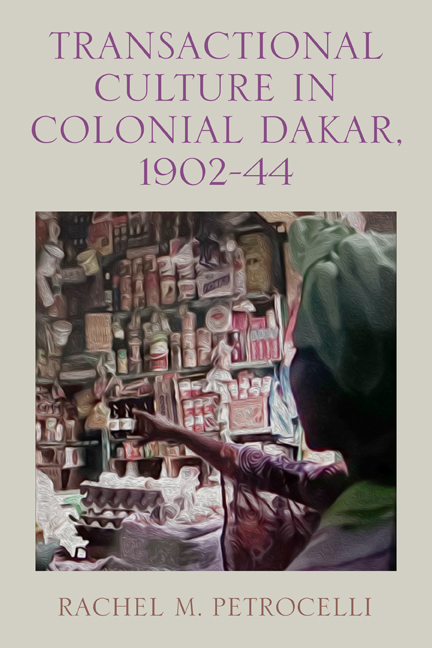Book contents
- Frontmatter
- Dedication
- Contents
- List of Illustrations
- Acknowledgments
- Introduction
- 1 Illusory Roots: Europeans, Autochthony, and Visions of a Capital City
- 2 The Rhetoric of Refoulement in Colonial Dakar
- 3 Challenges and Solutions of the Transient City
- 4 Impediments and Ingenuity in Financial Life
- 5 Ethnic Boundaries, Economic Niches, and Ambiguities in the Colonial City
- 6 The Lebanese and the Local in the Interwar Period
- 7 War’s Window: Urban Informality and Control
- Epilogue
- Bibliography
- Index
6 - The Lebanese and the Local in the Interwar Period
Published online by Cambridge University Press: 08 May 2024
- Frontmatter
- Dedication
- Contents
- List of Illustrations
- Acknowledgments
- Introduction
- 1 Illusory Roots: Europeans, Autochthony, and Visions of a Capital City
- 2 The Rhetoric of Refoulement in Colonial Dakar
- 3 Challenges and Solutions of the Transient City
- 4 Impediments and Ingenuity in Financial Life
- 5 Ethnic Boundaries, Economic Niches, and Ambiguities in the Colonial City
- 6 The Lebanese and the Local in the Interwar Period
- 7 War’s Window: Urban Informality and Control
- Epilogue
- Bibliography
- Index
Summary
Foreigners, Intermediaries, Dakarois
Dakar attracted many immigrants from origins beyond sub-Saharan Africa— notably, those from Europe, North Africa, and the Levant. During the inter-war period, the Lebanese became the most prominent—and most fiercely debated—immigrant, or “foreign,” community in Dakar, as they established themselves in various parts of West Africa.1 Over those decades, Lebanese Dakarois placed themselves in sectors that made them relevant to other city dwellers’ needs and integral to the fabric of the city's transactional culture. The more locally entrenched the Lebanese became, the sharper became the exter-nal focus on their status as foreigners. It was the very ability of the Lebanese to harness local economic opportunities by serving the African clientele that not only made them integral to the urban sectors of retail and credit but also singled them out to the French. Their direct commerce with African commu-nities generated hostility among French commercial stakeholders toward the Lebanese, especially during a time of global economic downturn.
French business interests pointed most directly and aggressively to the role of Lebanese traders in rural areas, where the peanut trade was of great interest and importance to colonial commerce. However, the role of Lebanese merchants in Dakar was not fully understood or interpreted as predatory in that way. The urban setting presented transactional options that were broad and often hidden. Like Cape Verdean Dakarois, Lebanese came to occupy a position in the colonial capital's transactional culture that was difficult for colonial administrators to classify. They operated in an economic space both French businessmen and administrators had neither truly grasped nor fully controlled, seen as neither European nor African. The state, but most frequently French commercial interests, turned to the notion of the intermediary to define the Lebanese. The concept of the intermediary as applied to the Lebanese in Senegal became infused with negative overtones for French stakeholders and, at times, the colonial state. The concept was a powerful one, as it appealed to the impulse to classify and know populations. In scholarship on the Lebanese in Senegal and other West African sites, the term intermediary has persisted as a descriptor of the community's role.
- Type
- Chapter
- Information
- Transactional Culture in Colonial Dakar, 1902-44 , pp. 129 - 147Publisher: Boydell & BrewerPrint publication year: 2024



